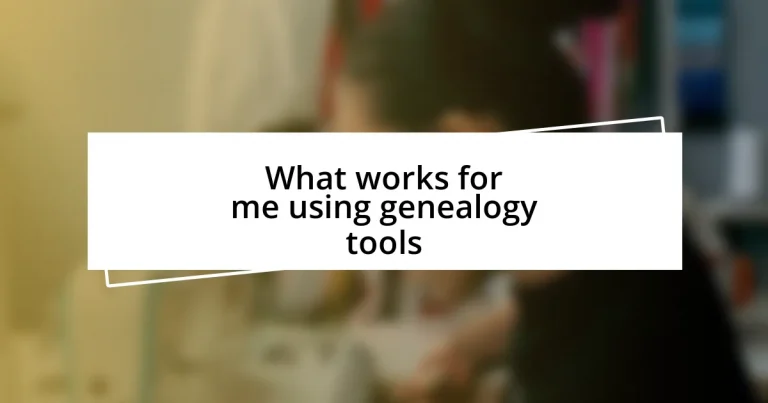Key takeaways:
- Genealogy tools are essential for uncovering family narratives, transforming daunting research into engaging stories.
- Choosing user-friendly genealogy software significantly enhances the research experience and fosters family connections through shared discoveries.
- Organizing data systematically, including digitizing documents and using spreadsheets, streamlines research and uncovers deeper family insights.
- Engaging with genealogy communities provides valuable support, knowledge, and opportunities for collaboration, enriching the overall research process.
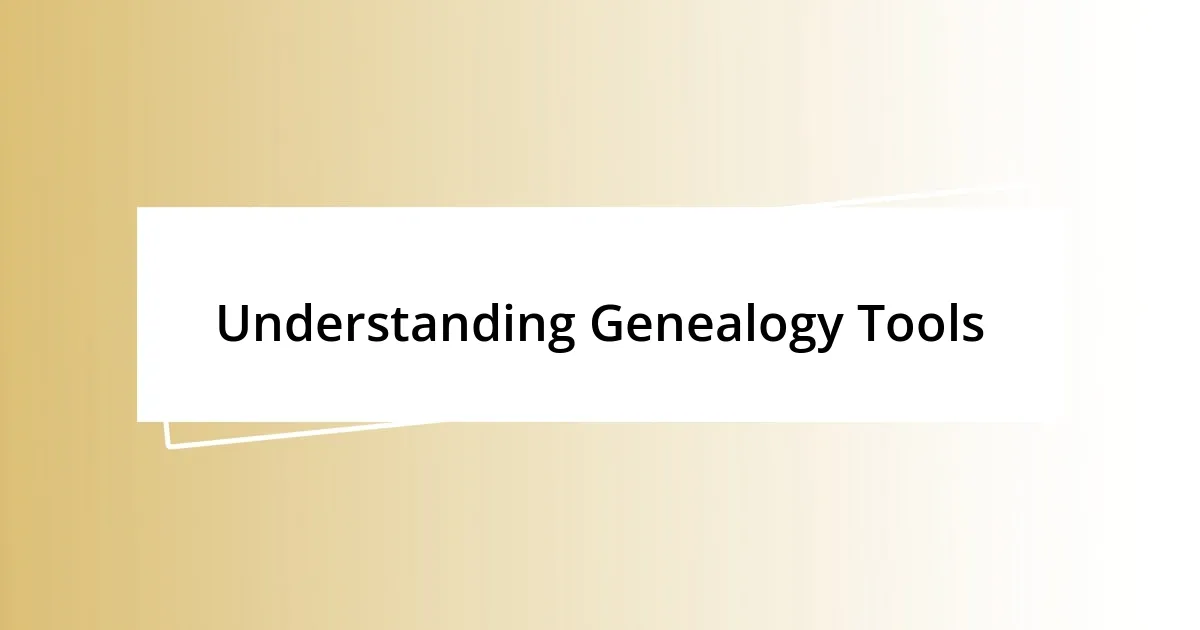
Understanding Genealogy Tools
Genealogy tools can seem overwhelming at first, yet they are invaluable for anyone starting their family history journey. I remember my initial experience with a genealogy software—there were so many buttons and features it felt like being a kid in a candy store! It was daunting, but gradually, I began to appreciate how each tool served a purpose in piecing together my family narrative.
Using online databases is another key aspect of genealogy work that genuinely excites me. I once stumbled upon a historical document that listed my great-grandparents’ names, and the thrill of seeing their lives unfold through records was astonishing. It made me realize how these tools connect us not just to facts, but also to the rich stories of those who came before us. Have you ever encountered a record that changed your perspective on your family’s past? It’s moments like these that make the research so rewarding.
Visualizing family trees with specialized software is incredibly impactful, too. I recall sitting with my family, exploring our ancestry on one of these tools, and watching their eyes light up as they saw branches stretching back in time. This tool not only clarifies relationships but also deepens our understanding of lineage, bringing stories to life in ways that mere text can’t convey. Isn’t it fascinating how these tools help us uncover connections we never knew existed?
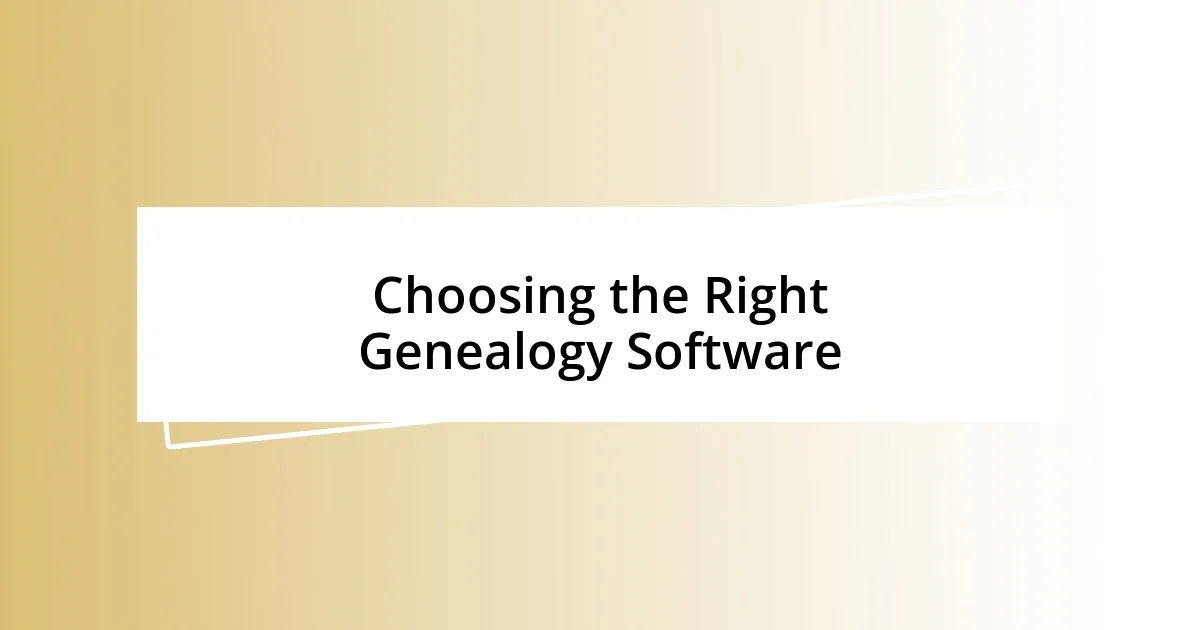
Choosing the Right Genealogy Software
Choosing the right genealogy software can make all the difference in your research journey. I remember the first time I had to decide which program to use. I tested a few, and it was like finding the right pair of shoes—each one had its fit and comfort level. For me, user-friendly interfaces were essential. I didn’t want to waste hours figuring out complicated menus while my ancestors were waiting to tell their stories.
When I finally settled on a piece of software that resonated with me, the experience skyrocketed. Features like data sharing with family members and integration with online resources became game-changers. I often reflect on that moment when I first shared my findings with relatives—everyone was captivated by our roots laid out so clearly. It was then I realized that the right software fosters not just personal discovery but also strengthens family bonds through shared heritage.
As you navigate this choice, consider what aspects are most important to you—be it ease of use, cloud accessibility, or research capabilities. I often recommend trying out a few options to see which feels right. Remember, the journey is personal, and so is the choice of your genealogy software.
| Software Name | Key Features |
|---|---|
| Family Tree Maker | User-friendly, customizable charts, collaboration features |
| Ancestry.com | Access to comprehensive records, DNA integration |
| Legacy Family Tree | Detail-rich reporting, multimedia support |
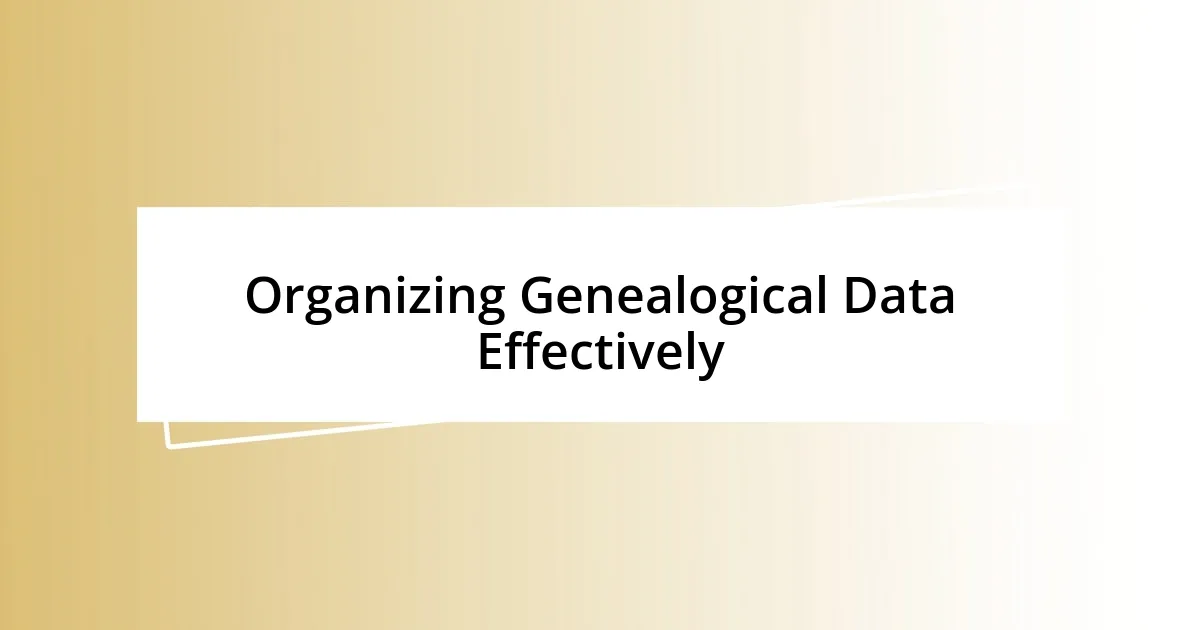
Organizing Genealogical Data Effectively
Organizing genealogical data effectively is crucial to unraveling family histories. From my experience, creating a systematic approach not only saves time but also enhances the research process. I often use folders categorized by family branches—this simple practice makes it easy to locate essential documents. When I first started, my files were all over the place. I felt overwhelmed, but through trial and error, I discovered the power of keeping everything in designated spots.
Here are some practical tips that have helped me stay organized:
- Digitize Documents: I recommend scanning physical records and storing them in cloud services for easy access and backup.
- Use Spreadsheets for Tracking: A spreadsheet can include important details like names, birth dates, and sources, making it simpler to cross-reference data.
- Establish Clear Naming Conventions: I’ve found that consistently labeling files with names and dates helps immensely in locating them later.
- Regular Updates: Schedule regular check-ins to refine and update your data, which can reveal new insights or connections.
Creating a visual representation of your findings can be equally rewarding. After constructing my first family tree, I couldn’t help but feel a wave of pride wash over me. It was as if I was holding a piece of history in my hands. Seeing the branches extend outward made the familial connections more tangible and exciting.
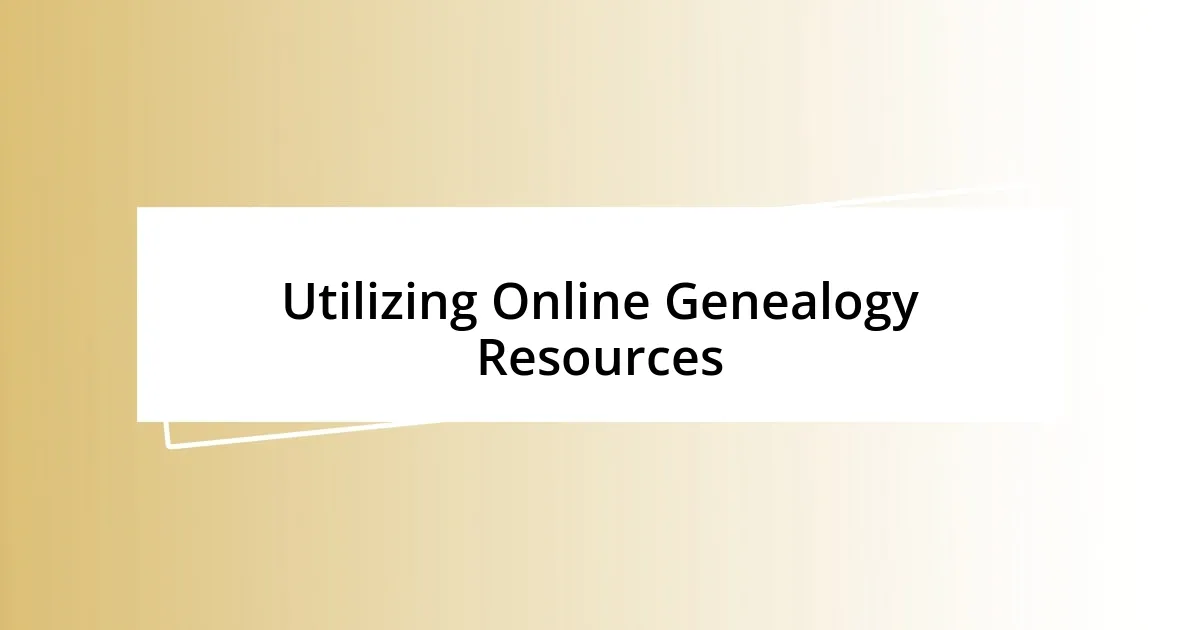
Utilizing Online Genealogy Resources
Utilizing online genealogy resources has transformed my research significantly. I vividly remember the thrill of accessing records from the comfort of my home. Searching through digitized archives felt like stepping into a time machine—one moment I was clicking through pages of census data and the next, I uncovered a long-lost relative’s obituaries. That rush of discovery is something I think every genealogist can appreciate. Have you ever had that moment when a new piece of information changes how you see your family history? Trust me, it’s exhilarating.
One tool I find indispensable is accessing the vast databases offered by sites like Ancestry.com and FamilySearch. When I first ventured into these platforms, I was amazed at the sheer volume of records available. I remember honing in on my great-grandfather’s immigration records—seeing his name for the first time felt monumental. I couldn’t help but wonder what his journey must have been like. These resources often include community trees or family stories shared by others, allowing us to connect with distant cousins and share insights. I’ve made invaluable connections that breathed new life into my research, weaving a richer tapestry of my family’s story.
Additionally, I’ve learned the importance of utilizing online forums and social media groups dedicated to genealogy research. Joining these communities not only provided me with answers to specific questions but offered support and camaraderie in challenging times. I once posted about a particularly tricky ancestor, and the flood of responses, each laden with unique perspectives, made me feel like I was part of something bigger. Reflecting on this, I can’t help but think—the journey of genealogy is truly a community affair. How has engaging with others shaped your own research?
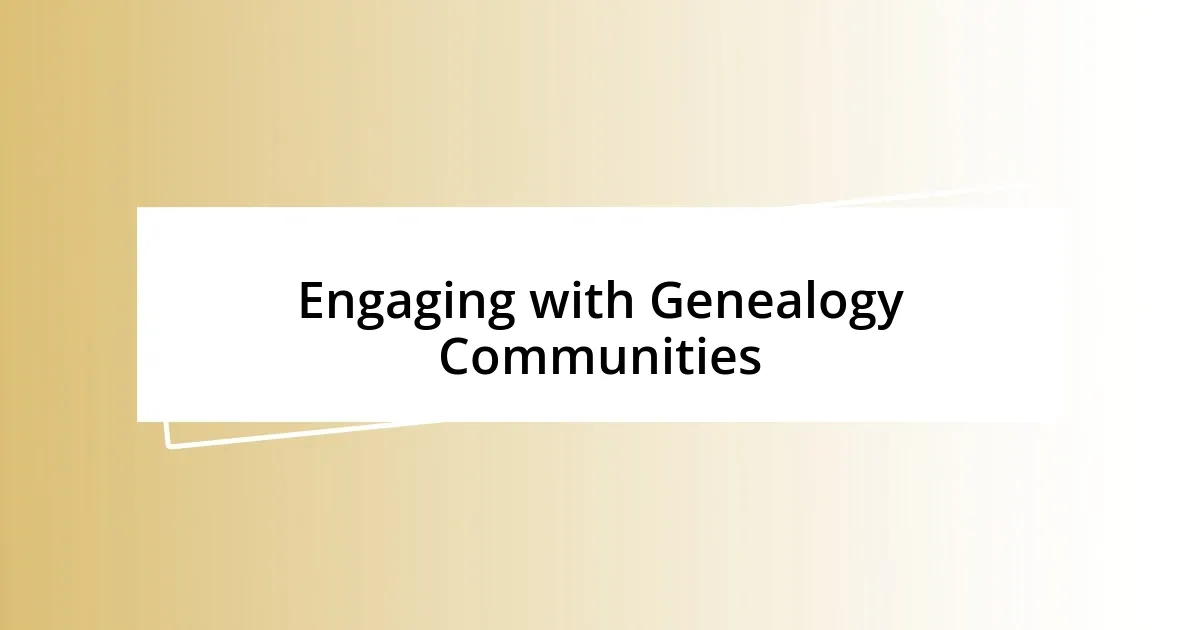
Engaging with Genealogy Communities
Connecting with genealogy communities has made my research experience not just productive, but profoundly enriching. I remember the first time I joined a local genealogy society; it was like stepping into a treasure chest of knowledge. Listening to seasoned researchers share their stories over coffee ignited my passion even more. Have you ever found support from a group that truly understands your interests? It’s invigorating.
Participating in online forums has also broadened my understanding immensely. I once shared a particularly perplexing family mystery involving an ancestor who seemed to vanish without a trace. The responses I received were overwhelmingly insightful. One fellow researcher speculated about a family connection I hadn’t even considered, leading me on a new path. The wisdom in these communities is remarkable—what surprises could you uncover by simply asking for help?
Moreover, attending events like genealogy fairs has provided me with not just knowledge but a sense of belonging. I recall standing in line to hear a speaker discuss DNA testing and family connections; the anticipation was electric. The excitement of meeting other enthusiasts who shared my desire for discovery reinforced the idea that we are not alone in this journey. Have you ever felt that spark of connection with fellow genealogists? It’s moments like these that make the research feel alive.
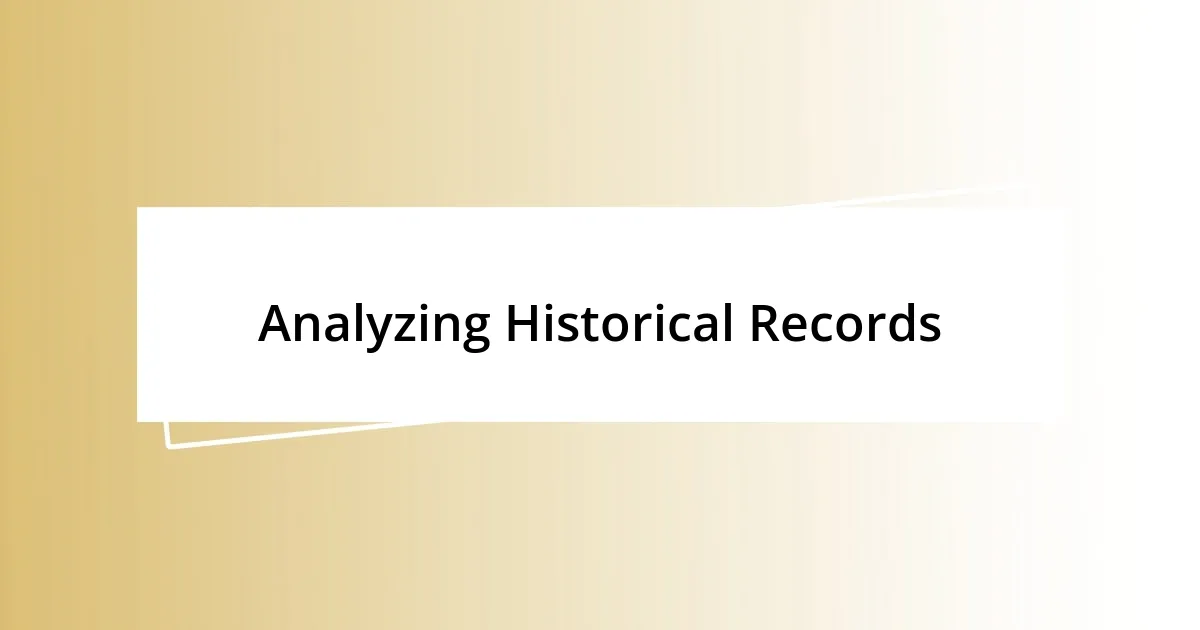
Analyzing Historical Records
Analyzing historical records is a crucial step in uncovering the story of our ancestors. I remember sitting at my desk, scrutinizing old marriage certificates and census records. Each detail, from a spouse’s name to the listed occupation, painted a picture of their lives. Have you ever felt the weight of a discovery shift your understanding of family dynamics? It’s fascinating how a single line can reveal so much.
What really strikes me is the context within which these records were created. For example, I once analyzed draft registration cards from World War I, and I was deeply moved by the ages of those young men, often just teenagers, who listed their occupations and hometowns. Understanding the historical backdrop of these records—like economic conditions or significant events—can enrich our understanding of our family’s narrative. How does knowing the history surrounding your ancestors’ lives shape your perspective on their choices?
Furthermore, cross-referencing multiple records can yield surprising insights. I recall piecing together my grandmother’s life through a collection of death certificates, property deeds, and even newspaper clippings about her charitable work. This detective work revealed her resilience and community spirit, which isn’t always obvious in just one document. Have you attempted to connect the dots between various historical records? It’s a rewarding experience that uncovers layers you didn’t know existed. Each finding feels like a puzzle piece fitting snugly into my family’s legacy.

Tips for Successful Family Research
One of the best pieces of advice I can give is to stay organized. I learned this the hard way after spending countless hours searching for a single name on my family tree, only to find it buried in a sea of notes. By adopting a digital tool, like a dedicated family tree software, I’ve made tracking connections and sourcing documents a breeze. Have you ever experienced that frustration of losing track? Keeping everything tidy can change your entire research experience.
Another tip I found invaluable is to interview family members early in the process. I still remember the day I sat down with my grandmother, who shared stories about her childhood that I had never heard before. Her anecdotes brought my ancestors to life in a way that no record ever could. Each small detail seemed to unveil the fabric of our family’s history, igniting new questions for further exploration. What hidden gems might your relatives hold that could pique your interest?
Lastly, don’t underestimate the power of patience. Genealogy can sometimes feel like a slow-moving train. There are moments when I’ve hit dead ends, and the adrenaline of discovery seems far away. Yet, it’s during these lulls that I learned to refine my research questions and broaden my search criteria. I’ve often returned to a surname or location after some time, only to uncover leads that felt elusive before. How has perseverance transformed your own research efforts?












